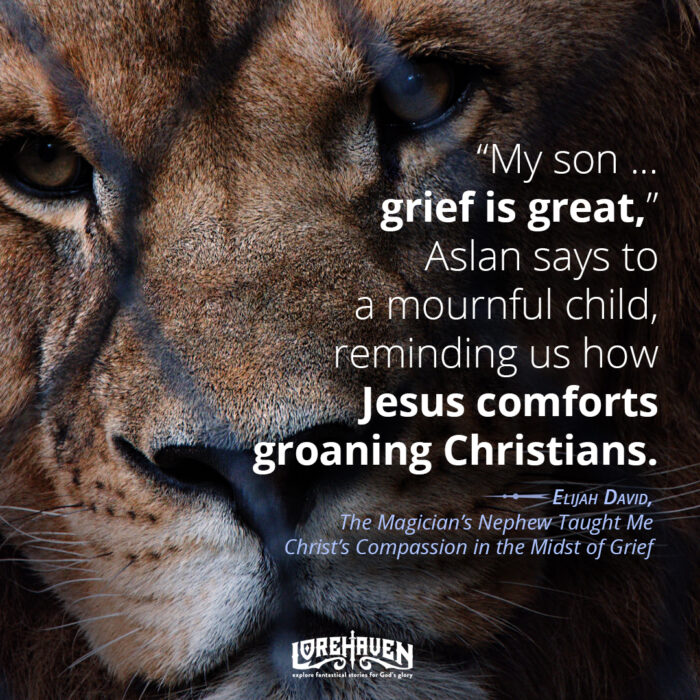The Magician’s Nephew Taught Me Christ’s Compassion in the Midst of Grief
The pages of C. S. Lewis’s Narnian prequel, The Magician’s Nephew, are filled with iconic and oft-quoted scenes and dialogue.1 But one conversation resonates with me even more as I grow older. This exchange comes very late in the book, after Aslan sings Narnia into being.
Digory has done the unthinkable. He has brought Queen Jadis (the future White Witch) into the land of Narnia on its first day, introducing evil into an otherwise innocent world. Aslan asks if Digory is ready to undo this wrong, and Digory consents. But thoughts of his dying mother back in England drive Digory to ask Aslan if he can offer anything to cure her. Then, Lewis tells us:
Up until then [Digory] had been looking at the Lion’s great feet and the huge claws on them; now, in his despair, he looked up at its face. What he saw surprised him as much as anything in his whole life. For the tawny face was bent down near his own and (wonder of wonders) great shining tears stood in the Lion’s eyes. They were such big, bright tears compared with Digory’s own that for a moment he felt as if the Lion must really be sorrier about his Mother than he was himself.
“My son, my son,” said Aslan. “I know. Grief is great. Only you and I in this land know that yet. Let us be good to one another.”2
This is a powerful reminder of the promise in Hebrews 4:15—that Christ sympathizes with us in our weaknesses because he endured them himself.
How one friend’s recitation helped me love this moment
During the first times I read the book, this scene did not strike me as important or powerful. Perhaps I felt distanced from grief. By then, both of my grandfathers had already died, almost before I could understand what happened. I would not face my next great bereavement until several years later, and I wouldn’t grow to understand until much later the void my grandparents had left in my life.
But later in my college years, friends from the NarniaWeb forums3 gathered together. At these gatherings (like good Inklings fans, we called them Moots), each of us would read passages from the Chronicles of Narnia that resonated with us. One friend recited the above scene from memory. He had chosen it for his own reasons, but the recitation planted this firmly in my heart, just as Digory planted the tree of protection at the end of his first Narnian adventure.
Years later, I would be grateful for his choice and the seed that he had planted.
How our Savior knows true grief and suffering
Although both of my grandfathers died when I was young, I was blessed to have a third man step into this role of mentor. I knew him as “Papa Del,” even before he married my Grandma. He became one of my most formative spiritual influences. As a young adult, I allowed grief over my biological grandfathers’ absence to pull me away from my relationship with Papa Del. That ended in 2019 when he also died.
I cannot describe the tumult my heart endured for months. All my old wounds seemed torn open afresh. But the seed my friend had given me years before had grown deep roots. Now this implanted truth shot up to the sky.
“My son, my son,” God whispered to my broken heart. “I know. Grief is great. Let us be good to one another.”
God does know the greatness of grief. He has known this since Adam and Eve sinned in the Garden. He knew this in Noah’s day, and Abraham’s, Moses’s, and David’s. Christ knew grief during his earthly ministry when the poor, afflicted, and hungry came to him. He knew this when his cousin John was killed and his friend Lazarus died. He knows our brokenness and meets us there.
Jesus has promised us hope among mourning
Paul tells us that “we do not grieve like the rest, who are without hope” (1 Thessalonians 4:13). We hope in the Resurrection because Christ has promised to raise us into his life. But we also find comfort in our earthly griefs because we know that Christ, who suffered as we have, is no stranger to our afflictions. He has suffered through them all, and even now he holds us up before the Father.
In recent days, I have been meditating on the biblical truths of Lewis’s words. As I write this article, my family faces another bereavement. Another grandparent has entered her final days. We know the end of this life approaches, but we do not know the day or the hour. And once again my heart echoes with these words: “I know. Grief is great. Let us be good to one another.”
May these words comfort all of us in our grief, and encourage us to show the love of Christ to one another.
- Photo by Andrey Lear on Unsplash. ↩
- The Magician’s Nephew, C. S. Lewis, chapter 12. ↩
- Amazing trivia fact: Elijah David and Lorehaven publisher E. Stephen Burnett first met at one of these fan gatherings. They nearly argued over “Calvinism” before becoming friends. ↩






























Well said sir, well said.
Yes!
Beautiful reminder of the brevity of human life and God’s infinite love for those He has chosen. Great work!
Thank you for this. My family has experienced many losses including the death of my son last April after a long battle with a rare neurodegenerative disease (he was 17 with the mind of a 4-year-old). I feel God’s love, compassion, and comfort. My hope is that in the novel I’m writing, I’ll be able to express the goodness and sovereignty of God that others may see and experience.